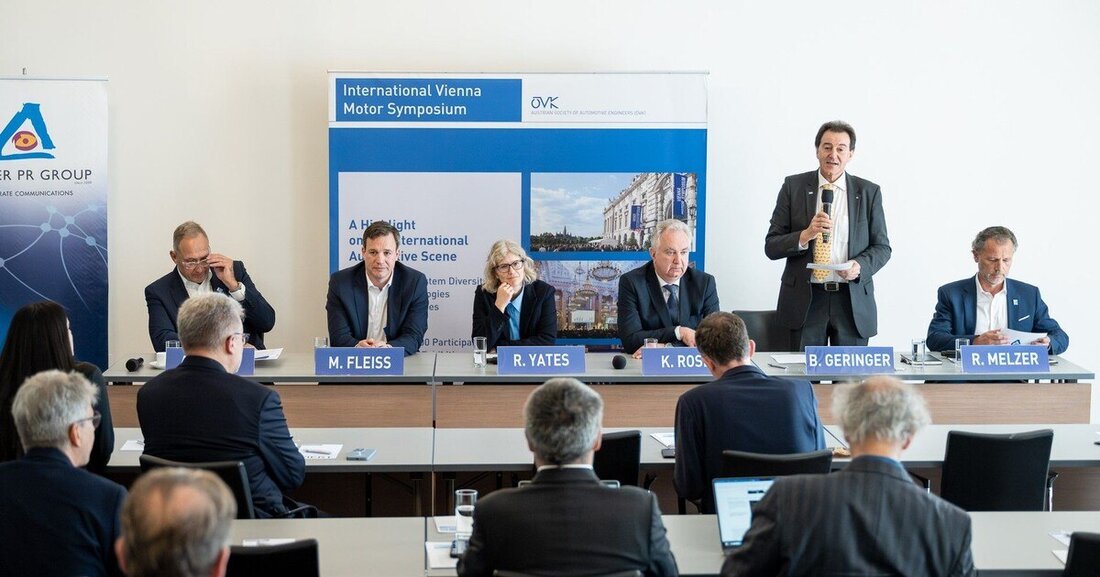Farewell to the combustion engine
At the Vienna Engine Symposium it became clear: the combustion engine is handing over the baton to the electric drive.

Farewell to the combustion engine
The latest innovations on the path to CO2-neutral and automated mobility were presented in 72 lectures at the 43rd International Vienna Motor Symposium in the Vienna Hofburg. More than 900 participants from 26 countries took part on site. The industry is facing a “colossal process of change,” said Bernhard Geringer, chairman of the Austrian Association for Automotive Technology and organizer of the symposium. As a “symbol of transformation,” Markus Schäfer, Member of the Board of Management of Mercedes-Benz Group AG, presented the Vision EQXX, which can travel more than 1,000 km on a single battery charge. According to Schäfer, it is not yet clear whether the car will come onto the market in its current form, but the technology from the EQXX will definitely be implemented. Overall, Daimler only wants to offer zero-emission cars by 2030, and production will also be climate-neutral.
“The road to e-mobility will be relatively long,” said Luca de Meo, CEO of the Renault Group. In the coming years, the group plans to invest a further 23 billion euros in this area. But the combustion engine will also continue to be improved, says de Meo. He expects that around 90 percent of vehicles worldwide will have an internal combustion engine by 2030 and named three important points: customer benefit, eco-footprint and affordability. Because of the electricity mix in many regions, including Germany, the eco-footprint of an electric car is higher than that of an economical hybrid car. In addition, rising raw material prices are making electric cars more and more expensive. Conclusion: Customers will therefore keep their existing cars for longer, which is why solutions urgently need to be found for existing vehicles in the transition to CO2 neutrality. In his opinion, alternative fuels can make an important contribution to CO2 reduction. In order not to let the costs of the transformation get out of hand, Renault wants to significantly reduce its model and engine variety.
Thomas Ulbrich, member of the brand board at Volkswagen, also announced significantly fewer model variants. VW wants to soon replace all electric platforms in the group with the mechatronic architecture SSP (Scalable Systems Platform). The first model on this platform is the Trinity, which is expected to enable Level 4 autonomous driving in the mass segment for the first time in 2026. The range is said to be 700 kilometers, and the top version sprints from 0 to 100 km/h in 3.5 seconds. The ID.Life, which was introduced last year, is planned as the future entry-level model. Volkswagen estimates that by 2030 around 70 percent of its new registrations in the EU will have a battery-electric drive, and around 50 percent in the USA and China. VW will therefore offer models with combustion engines beyond 2030. Plug-in hybrids should play an important role in this. In the future, they should create an electric range of around 100 km.
Wolf-Henning Scheider, CEO of the ZF Group, explained how drastically the energy transition is changing the business of automotive suppliers: “ZF will no longer be building transmissions from 2040.” ZF currently has a turnover of ten billion euros. The development of internal combustion engine components was stopped two years ago. In 2030, Scheider expects ZF to have higher sales from components for e-mobility than the group ever achieved with transmissions. ZF focuses on modular core components of the electric drive such as power electronics and software. The Upper Austrian supplier group Miba is also fully involved in the transformation, as F. Peter Mitterbauer, CEO, showed. On the one hand, conventional drives are being further optimized; on the other hand, the company has been working on the development and production of important components for electrified drives, especially for battery systems, electric motors and electric drives, for seven years. Like many of his board colleagues at the symposium, Mitterbauer called for lawmakers to be more open to technology.

 Suche
Suche
 Mein Konto
Mein Konto